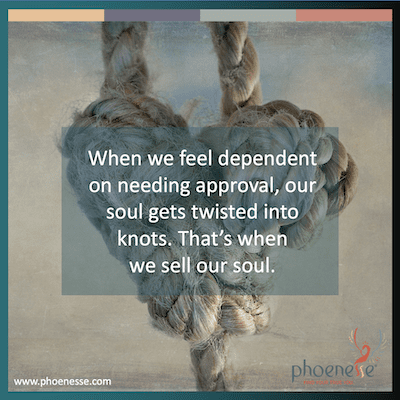
When we feel dependent on needing approval, our soul gets twisted into knots. That’s when we sell our soul.
The mass image of self-importance
People are funny. We’re each a particular blend of shortcomings and weaknesses, jumbled up with a desire to be perfect and needing to feel special. This jarring combination creates a hidden belief that we are all party to, regardless of geography, time period or environment. It goes like this: “If I can just get enough approval or attention or admiration, my worth will be established in the eyes of the world, as well as in my own eyes. If I can’t get it, then I really am inferior.”
We might not think this out loud, but still it’s there in our emotions and so also in the way we behave. But believing it doesn’t make it true. In fact, it’s an illusion. And the whole purpose of doing this spiritual work of self-discovery is to free ourselves from illusion. For in no way, shape or form can any illusion ever bring us peace, harmony or freedom. Just the opposite, whatever is illusory is bound to create trouble. This one sends out massive ripples that create a cascading chain reaction of harmful effects.
Believe it or not, spirit beings can actually hear our souls shrieking for attention when they approach Earth. And since all human souls are actually clamoring for attention, just imagine how noisy this place is for the angels! Yes, even though we can’t hear it with our own ears, the voices of our souls are noisy, as all emotions produce some kind of sound. And the loud voices that claim self-importance make a disharmonious racket.
Believe it or not, spirit beings can actually hear our souls shrieking for attention when they approach Earth.
This widespread unconscious misunderstanding—or as the Guide calls it, this mass image—about self-importance shows up differently for each of us, depending on things like temperament, education and environment. Sometimes it’s very noticeable, and sometimes it’s very subtle. And a more obvious demand doesn’t necessarily reflect a less developed soul, as it’s often just a matter of degree of suppression.
But if we look for it, we’ll find this part of us that wants to be elevated to first place. We want to be special. It’s really not enough to call this pride. Rather, it’s the deeper belief that if we are special, our feelings of inferiority will disappear. Poof. It’s the belief that if others are on our team, agreeing with whatever we think or believe, we’ll become worthy. Finally.
But of course, most of us have actually also found out by now that no matter how much we’re approved of, the relief doesn’t last. The feeling of “success” is temporary, at best. We just can’t win.
What’s happening is that we are using prideful behaviors—presenting ourselves as better than the rest—to save ourselves from a make-believe disaster. This is why just seeing our pride in action is not enough to completely disentangle us. We must also uncover this hidden inner demand to feel special.
Finding the source of the problem, within
To get all the way to the nut of this one, we’ll need to hear our own inner voice shrieking for approval. We have to catch it in action, shouting to be heard. We need to ask ourselves: What’s my demand? When we find the answer, we’ll become aware of this hidden clamoring for self-importance.
People, this one does a lot of damage. And until we know this, we won’t have the incentive we need to find and eliminate it. But rest assured, it is responsible for bringing us many of our conflicts and difficulties.
It can be hard to uncover because, even though everyone has this, it doesn’t show up the same way in everyone. One person might seek out material wealth, thinking surely that will cement their stature in the eyes of the world. Someone else might focus on another value—a particular talent or accomplishment—for gaining approval and admiration. Yet another might go for high intelligence, good character, or loyalty and decency. Often, it’s some combination of attributes.
There’s even a category of people who use misfortune or sickness as a way to gain sympathy, with sympathy standing in for approval. For we mistakenly believe that we stand or fall depending on what other people think of us, and that without the world’s approval, we are lost. In short, we have no firm ground under our feet.
There’s even a category of people who use misfortune or sickness as a way to gain sympathy, with sympathy standing in for approval.
The answer, however, is not to simply go the other way and act like we don’t care what others think of us. Or worse, to try to go in two opposite directions at once—not caring what others think while, at the same time, wanting their approval—which happens more often than we might realize.
To be clear, resorting to “I don’t care what people say” is merely rebellion. And when we’re rebelling, we’re still in bondage. This is not the right way to go about freeing ourselves. Because, in fact, what we’re actually rebelling against is the fact that we’re dependent on the world’s opinion.
The real remedy lies in figuring out why we feel so bound up to begin with. What is the mistaken belief we’re sitting on that has us imprisoned? If we can crack this, we can set ourselves free from a compulsive need for approval.
Since other people’s favorable opinion is never going to be our salvation, we can stop trying so hard. We can also stop selling ourselves out to get it. For that, folks, more than anything else, leads to feelings of inferiority.
This image leads to so much inner turmoil. For, so often, we can’t possibly please everyone else and be true to our own life plan. And more than that, it’s not possible to please all people. As such, when we feel dependent on needing approval, and then are forced to take a stand on something that makes it impossible to be approved of by everyone, our soul gets twisted into knots. That’s when we sell our soul. And at some point, we have all done this.
Connecting the dots with betrayal
Here’s something else that, at some point or other, has happened to each one of us: we have felt betrayed. Here we were, showing the utmost decency and loyalty, and yet despite how good we’ve been, we’ve been felled by the deep disappointment of a betrayal. And then, adding salt to the wound, the offender may have turned around and claimed they were the one who was betrayed, in order to justify their behavior!
When this happens, we end up doubly hurt. For we are accused of having done the very things we experienced as the victim. This makes the whole thing even harder to bear. For the pain of what we’re accused of is harder to bear than the betrayal itself. We search inside and can’t see how we are to blame. But yet, a deep uncertainty persists. Why did this happen?
For if we’ve gone a certain way down any spiritual path, we’ll have come to realize this truth: no mishap ever happens to us that we have not, in some way, caused. Intellectually, we might know this is true, and we may have confirmed it through our own personal discoveries. Still, when something like a betrayal happens, we’re stumped. What’s the connection to us? Where is the cause in me?
So here’s the trail of crumbs, which will lead us back to our hidden belief, or group image, of self-importance. It all starts with that mistaken unconscious belief that makes us fight to be in first place, to be special. This, we believe, will allow us to collect what we need: approval.
We don’t even want to acknowledge this inner climber that so desperately wants to be on top.
Well, in order to get to first place, our actions are going to need to be anything but ideal. We can kiss loyalty and decency goodbye. We are willing to be ruthless and selfish, and we will betray whatever is in our way, including the very people or thing we deeply desire to be loyal to. ‘Cause hey, we have to do what we have to do to win.
Yes indeedy, in order to gain the prized approval, we are mighty tempted to do the very thing that we will, in fact, in the end, not do. For we are also, in fact, decent and honest people. So we don’t give in to that temptation. Yes, we feel the pull of it, vaguely, but we don’t give it much attention. And we therefore aren’t aware of what it really means.
To be sure, good boys and girls that we are, we cover those feelings up mighty quick. We don’t even want to acknowledge this inner climber that so desperately wants to be on top. We don’t act on it, we don’t acknowledge it, and in the end, we aren’t even fully aware it exists. We’ll even go the extra mile to offset its influence by overcompensating and scrupulously proving our decent side, for that’s the side, by God, we’re lined up to obey.
What’s the upshot of this hidden inner battle? Sorry to say, the outer world lines up in response to the unconscious negative side, and not, as we would have hoped, to mirror the positive side—even though the positive side is what won out in our actions!
This happened due to an unalterable spiritual law: Outer results must respond to the impulse that is unconscious. So if the battle we are fighting is not brought up to our conscious awareness, the events in our lives will follow as though the selfish side has won out.
Uncovering powerful unconscious beliefs
Don’t believe it? Start paying attention to how life is not serving you what you consciously want. Then start doing the work of healing, which involves uncovering what lies smoldering in the unconscious. When we do this, we start to experience for ourselves the utter truth of these teachings.
Does this seem unjust? Are you thinking, “As long as I don’t give in to that temptation, I shouldn’t experience consequences as though I did! Aren’t my actions what matter?” In a word, No. For feelings are also actions, just showing up differently and with slower results. Nonetheless, everything we think and all our attitudes—whether they’re conscious or not—are definite acts. But the more unconscious they are, the bigger the consequence. And hence, the more puzzling the outcome.
When we buck up and face our negative side, we are displaying the bravest emotion there is: self-honesty. So there’s no shame in needing to face this inner battle. It’s to our credit that we are willing to go there. And we’ll be much more efficient in our efforts if we will let all this enter our conscious mind. By understanding the laws at work, we’ll no longer feel an injustice has occurred, and our hurt will lessen, a lot.
When we buck up and face our negative side, we are displaying the bravest emotion there is: self-honesty.
Best of all, there’s a really good chance that such betrayals and accusations won’t come our way again. Because once we wrestle our negative side into the light, it loses its power. But should such an event happen again, we won’t react in the same way. Instead, we’ll learn a lot and we will end up feeling strengthened, not weakened. We will get how our experience is constructive, and may even be able to steer the course of events into a positive direction.
All told, by recognizing this inner clamoring for feeling special, and by seeing how it has been governing us, we can take a major step forward toward inner freedom. We need to search in this direction any time we feel unjustly treated but can’t see any wrongdoing on our part.
Take note, our desire to feel special isn’t due to malice or because we want to belittle someone else—who of course would automatically become smaller if we were to become bigger—nor is it done out of pride, just for the sake of pride. No, what we are grappling with here is a mistaken notion that to be special means to survive. So don’t get caught in unkind self-accusations.
It’s just that we’ve been harboring a wrong idea for a very long time. And by seeing this trend, we can free ourselves from depending on other people’s opinion of us. Our emotional wellbeing depends only on our own opinion of ourselves. Conversely, the more we cater to what other’s think, the less we will think of ourselves, deep in our soul.
We each need to look closely for this part that causes us so much suffering and makes us pull away from our friends and loved ones. When we find it, we will enter into reality, and our entire outlook on life will change.
—The Guide’s wisdom in Jill Loree’s words

Next Chapter • Return to Contents
Read Original Pathwork® Lecture: #57 The Mass Image of Self-Importance
We Can Heal | After the Ego • Blinded by Fear
Real. Clear. series | Holy Moly • Finding Gold • Bible Me This • The Pull • Pearls • Gems • Bones • Nutshells
All essays | Get a Better Boat • Living Light • Latest essays
Self. Care. series | Spilling the Script • Healing the Hurt • Doing the Work
More books | Walker • Word for Word • Spiritual Laws • Keywords



